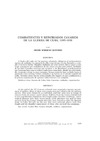Please use this identifier to cite or link to this item:
https://accedacris.ulpgc.es/jspui/handle/10553/58761
| DC Field | Value | Language |
|---|---|---|
| dc.contributor.author | Márquez Quevedo, Javier | en_US |
| dc.date.accessioned | 2019-12-16T19:49:41Z | - |
| dc.date.available | 2019-12-16T19:49:41Z | - |
| dc.date.issued | 2010 | en_US |
| dc.identifier.issn | 0570-4065 | en_US |
| dc.identifier.other | Dialnet | |
| dc.identifier.uri | https://accedacris.ulpgc.es/handle/10553/58761 | - |
| dc.description.abstract | A finales del siglo XIX las guerras coloniales obligaron al reclutamiento masivo de soldados. La mayoría de ellos eran jóvenes recién llamados a cumplir el servicio militar. Elegidos mediante un cruel sorteo, iban a parar a una tropa compuesta por ciudadanos de las clases sociales más pobres. Soldados de las Islas Canarias tuvieron que sumarse a los batallones expedicionarios que lucharon bajo unas terribles condiciones materiales, donde las enfermedades tropicales serían su peor enemigo. Escasa atención han recibido hasta el momento estos reclutas isleños alistados a la fuerza en el ejército español de Cuba. Veremos cómo fueron seleccionados, los lugares en que combatieron y la penosa repatriación de quienes sobrevivieron a la campaña. | en_US |
| dc.description.abstract | At the end of the 19th Century colonial wars required a massive recruitment of soldiers. Most of them were young men just called to do the military service. They were chosen by a cruel draw and they were sent to troops of citizens from the poorer social classes. Soldiers from the Canary Islands had to join expeditionary battalions that fought under horrible conditions, where tropical diseases were their worst enemy. Little attention was paid to these recruits from the Canary Islands after they were forced to enlist the Spanish Army in Cuba. We will see the way they were selected, places were they fought and the dreadful repatriation of those who survived the campaign. | en_US |
| dc.language | spa | en_US |
| dc.relation.ispartof | Anuario de Estudios Atlánticos | en_US |
| dc.source | Anuario de Estudios Atlánticos [ISSN 0570-4065] (56), p. 169-198 | en_US |
| dc.subject | 55 Historia | en_US |
| dc.subject.other | Guerra de Cuba | en_US |
| dc.subject.other | Islas Canarias | en_US |
| dc.subject.other | Soldados | en_US |
| dc.subject.other | Repatriación | en_US |
| dc.subject.other | Cuban War | en_US |
| dc.subject.other | Canary Islands | en_US |
| dc.subject.other | Soldiers | en_US |
| dc.subject.other | Repatriation | en_US |
| dc.title | Combatientes y repatriados canarios de la Guerra de Cuba, 1895-1898 | en_US |
| dc.type | info:eu-repo/semantics/article | en_US |
| dc.type | Article | en_US |
| dc.identifier.url | http://dialnet.unirioja.es/servlet/articulo?codigo=3298217 | - |
| dc.description.lastpage | 198 | - |
| dc.identifier.issue | 56 | - |
| dc.description.firstpage | 169 | - |
| dc.investigacion | Ciencias Sociales y Jurídicas | en_US |
| dc.type2 | Artículo | en_US |
| dc.contributor.authordialnetid | 1237557 | - |
| dc.identifier.dialnet | 3298217ARTREV | - |
| dc.identifier.ulpgc | Sí | es |
| item.fulltext | Con texto completo | - |
| item.grantfulltext | open | - |
| crisitem.author.dept | GIR Grupo Universitario de Investigación en Relaciones Internacionales | - |
| crisitem.author.dept | Departamento de Ciencias Históricas | - |
| crisitem.author.orcid | 0000-0003-4620-5805 | - |
| crisitem.author.parentorg | Departamento de Ciencias Históricas | - |
| crisitem.author.fullName | Márquez Quevedo, Javier Octavio | - |
| Appears in Collections: | Artículos | |
Page view(s) 5
285
checked on Aug 31, 2024
Download(s)
232
checked on Aug 31, 2024
Google ScholarTM
Check
Share
Export metadata
Items in accedaCRIS are protected by copyright, with all rights reserved, unless otherwise indicated.
